AEGEAN & GREEK - HISTORY 2
1/110
There's no tags or description
Looks like no tags are added yet.
Name | Mastery | Learn | Test | Matching | Spaced | Call with Kai |
|---|
No analytics yet
Send a link to your students to track their progress
111 Terms
Amphora
A Vase with a large oval body and a narrow cylindrical neck with handles that rise almost to the level of the mouth. Used to carrying and storing liquids (oil, milk, wine, etc.).

Pelike
Used to store liquid. It has two vertical open handles on its lateral aspects and even at the side with the edge of the belly, a narrow neck, a flanged mouth, and a sagging, almost spherical belly.
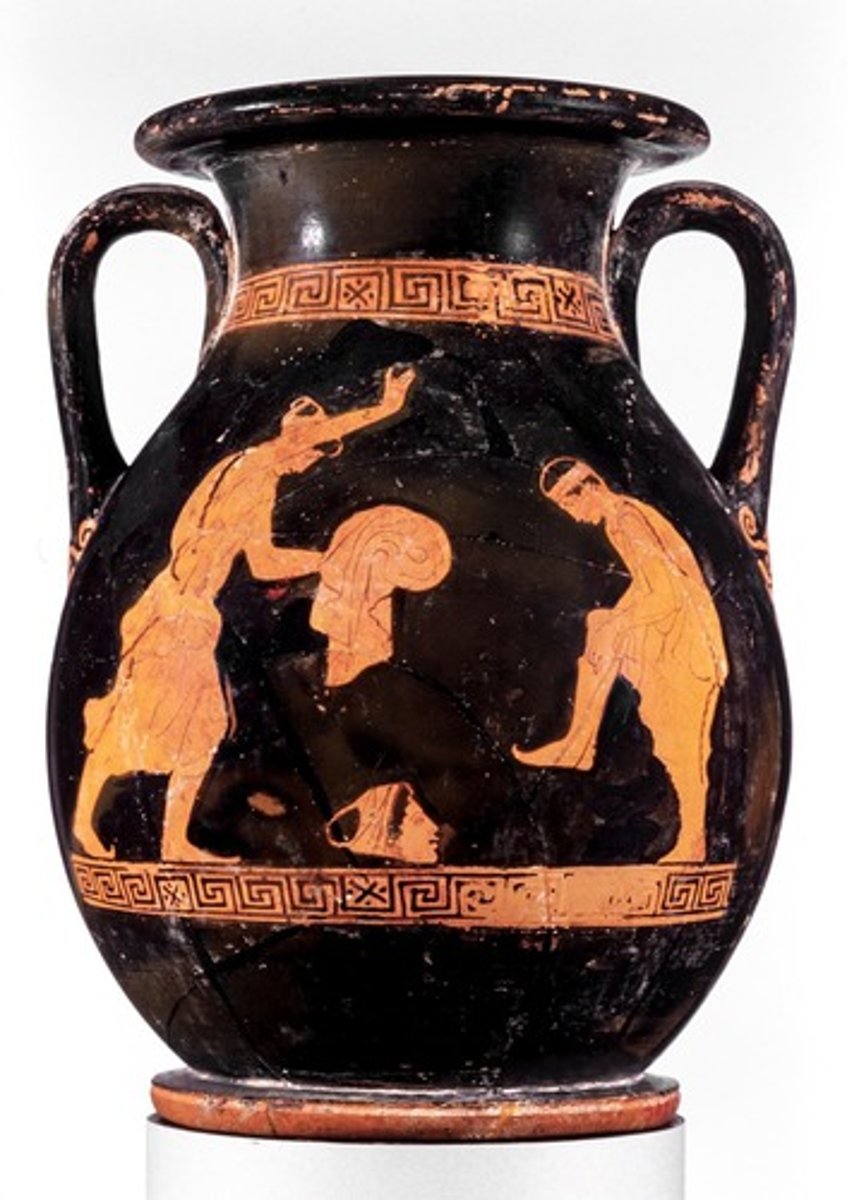
Stamnos
A wide-mouth vase with 2 lids and handles on its shoulders. Used to hold wine before mixing with water.
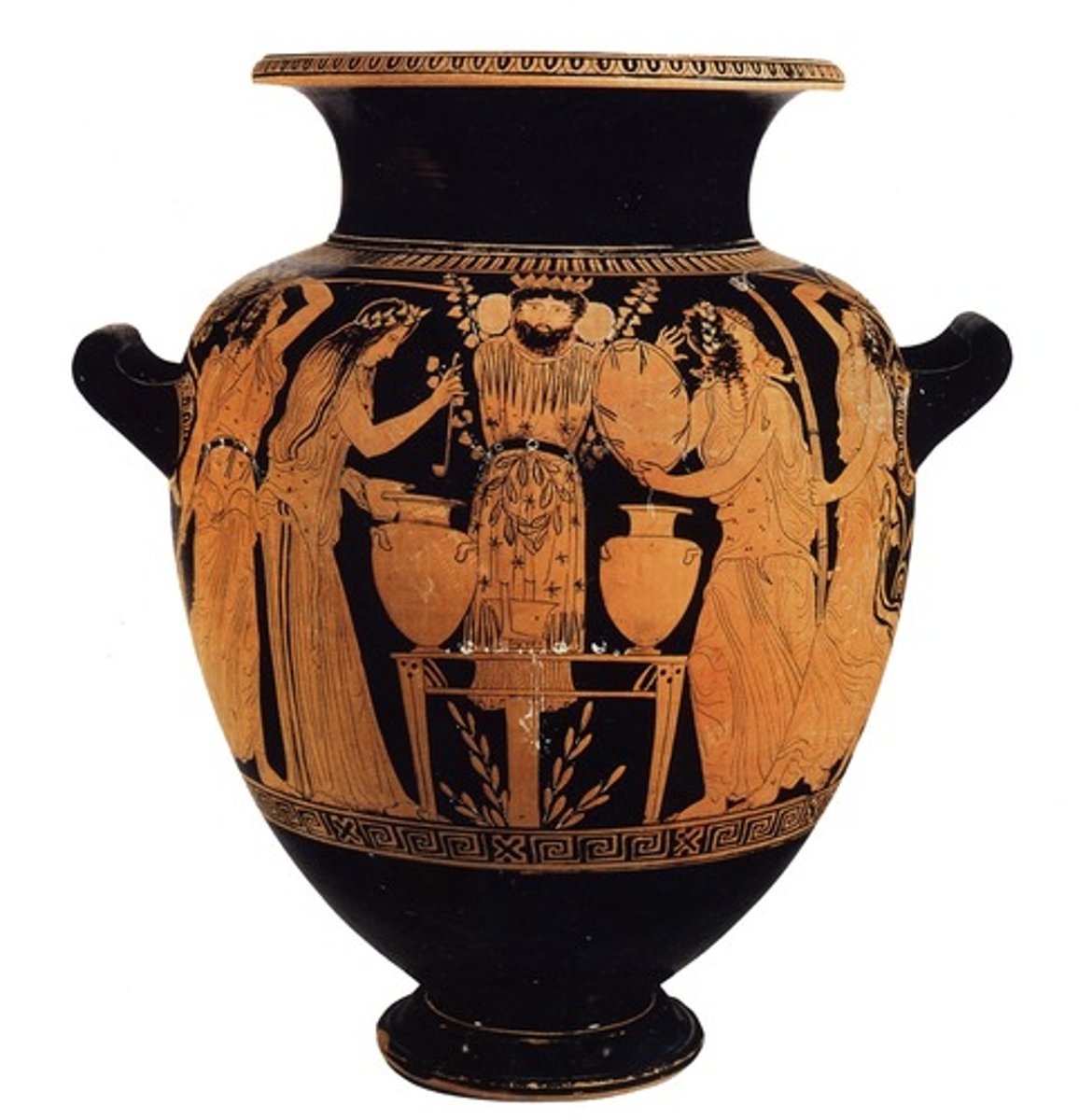
Psykter
A vase characterized by a bulbous body and narrow foot. Used to cooling wine at symposium.
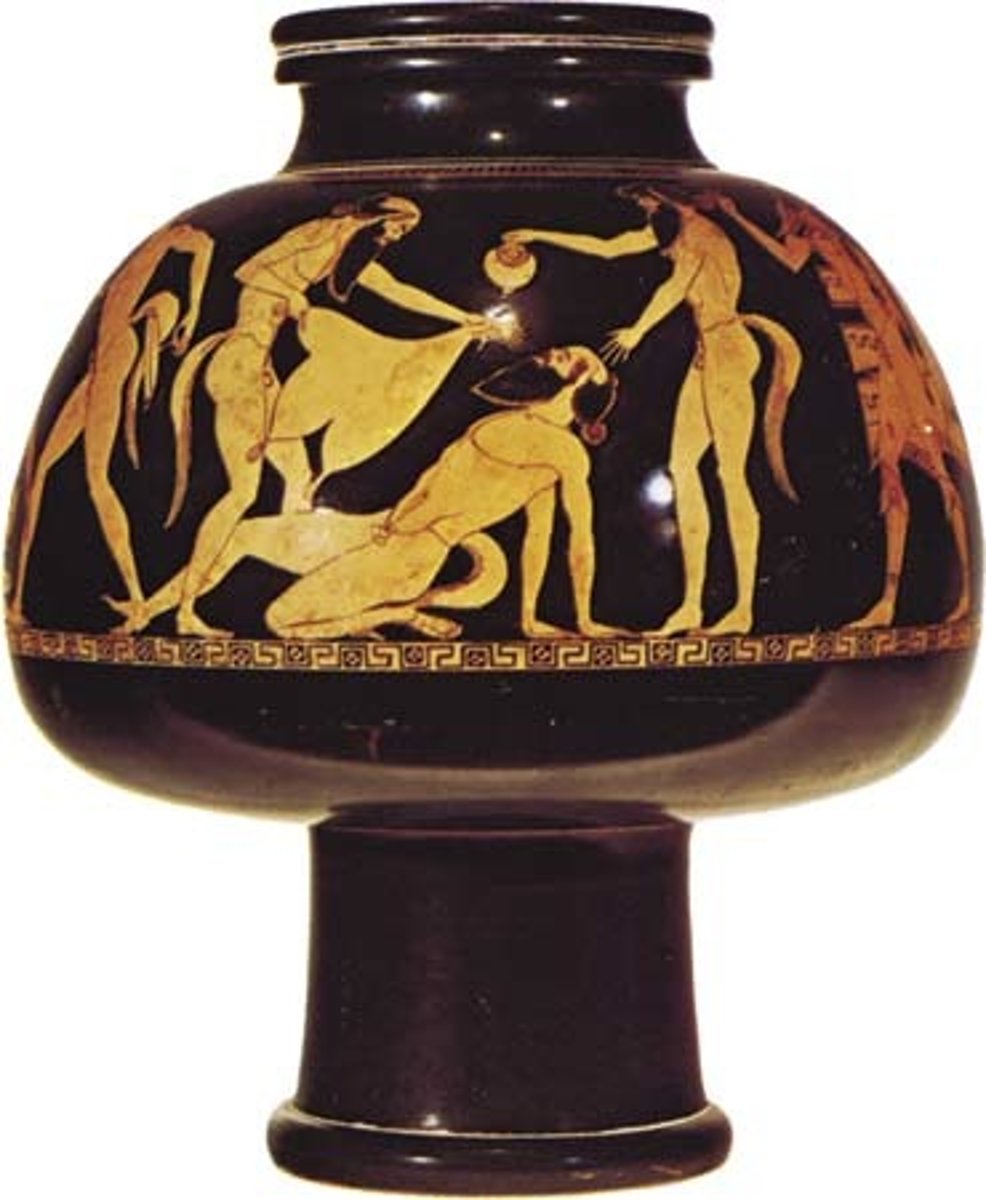
Hydria
A round-shouldered, full-bodied vessel, an articulated neck, and an overhanging ring-shaped torus lip. Used as a water vessel. (Jug)
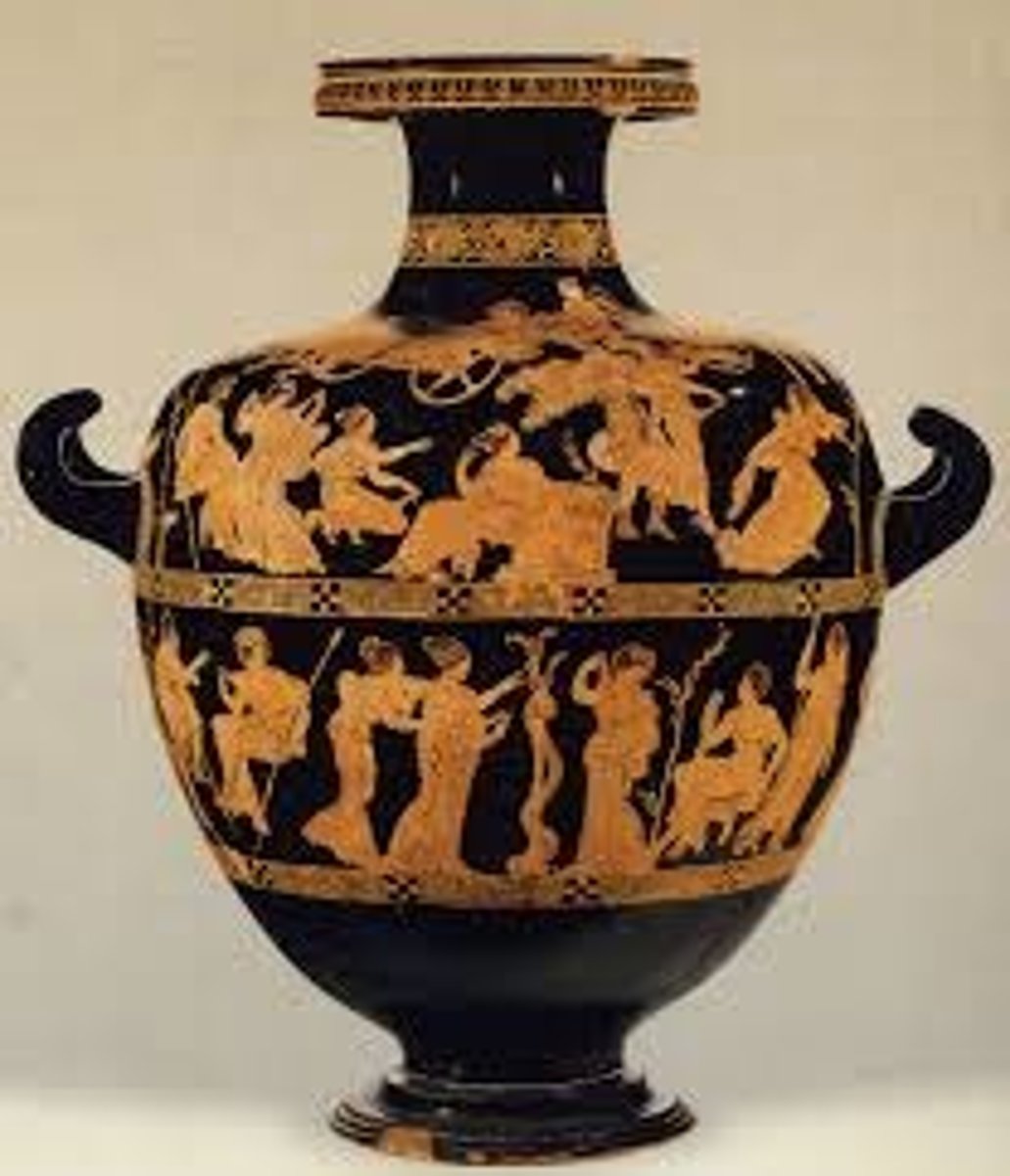
Oinochoe
A vessel with no distinct shoulder and usually a handle rising above the lip. Used as a wine jug to serve at gatherings.
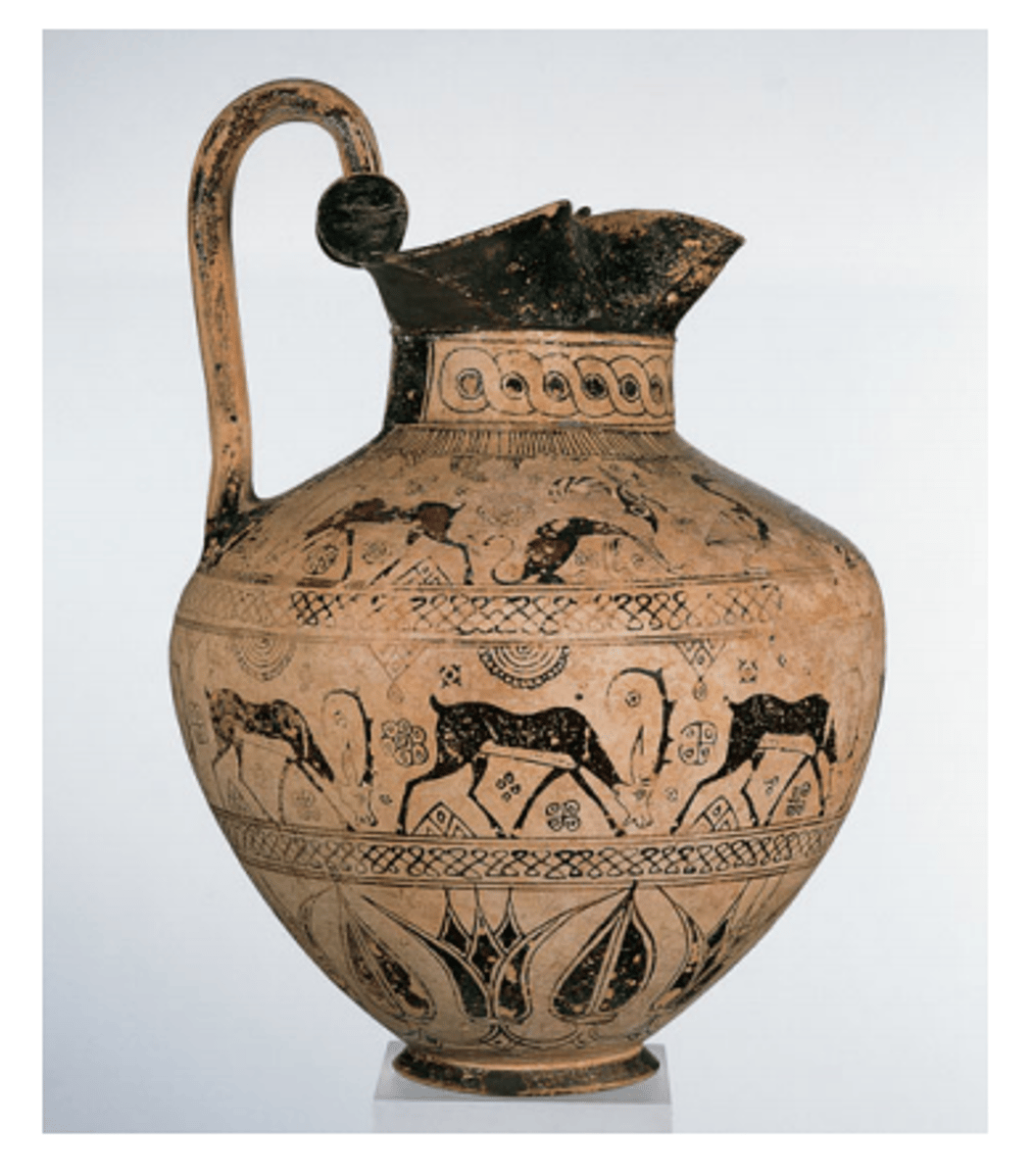
Volute Krater, Calyx Krater, Column Krater, Bell Krater
A large two-handled type of vase to mix wine with water.
Kylix, Stemles Kylix
A shallow bowl with horizontal handle extension. Used for wine cups
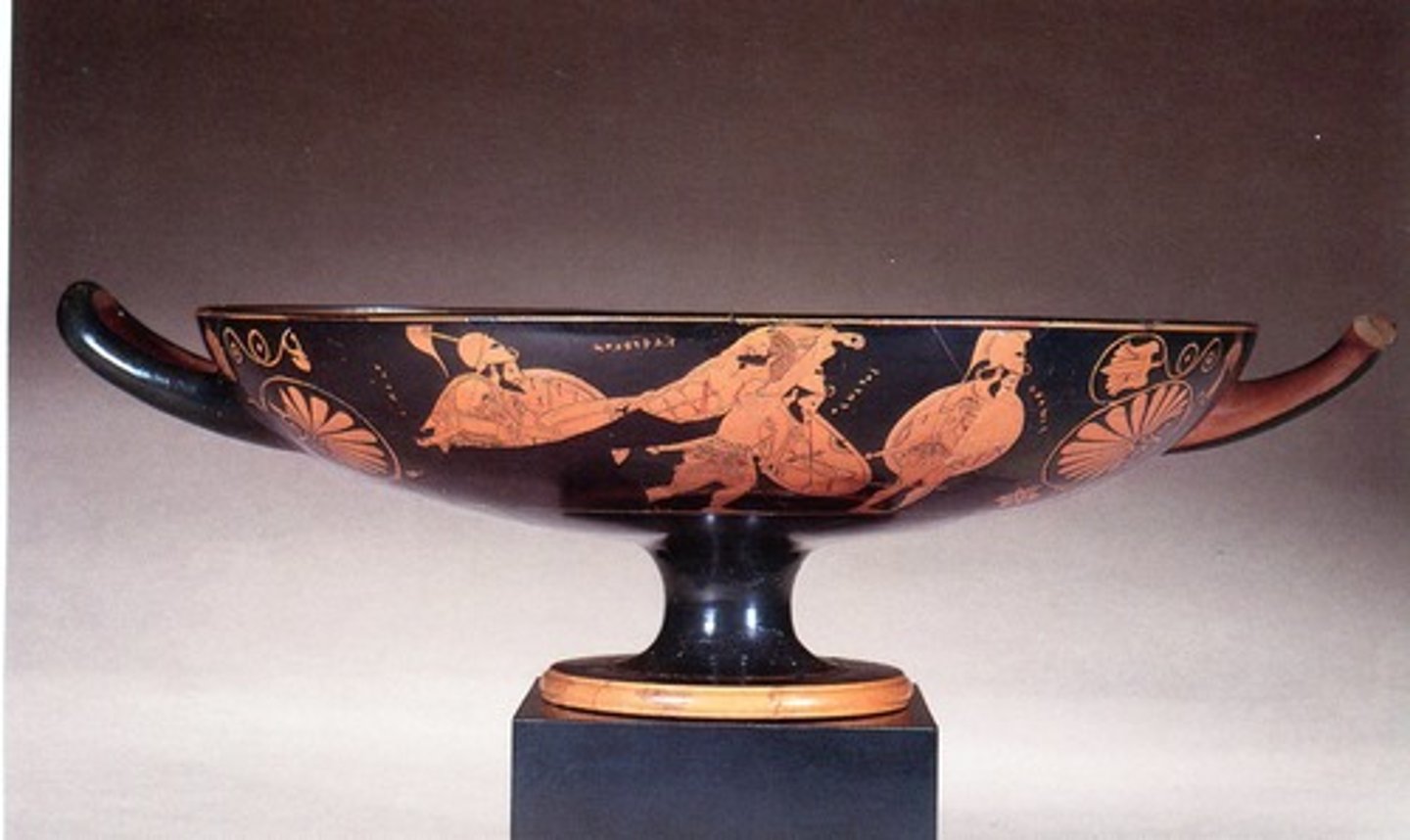
Kantharos
A deep drinking bowl, a tall pedestal foot, and a pair of high vertical handles. Used for drinking wine and ritual purposes. Wine cup used by Dionysus.
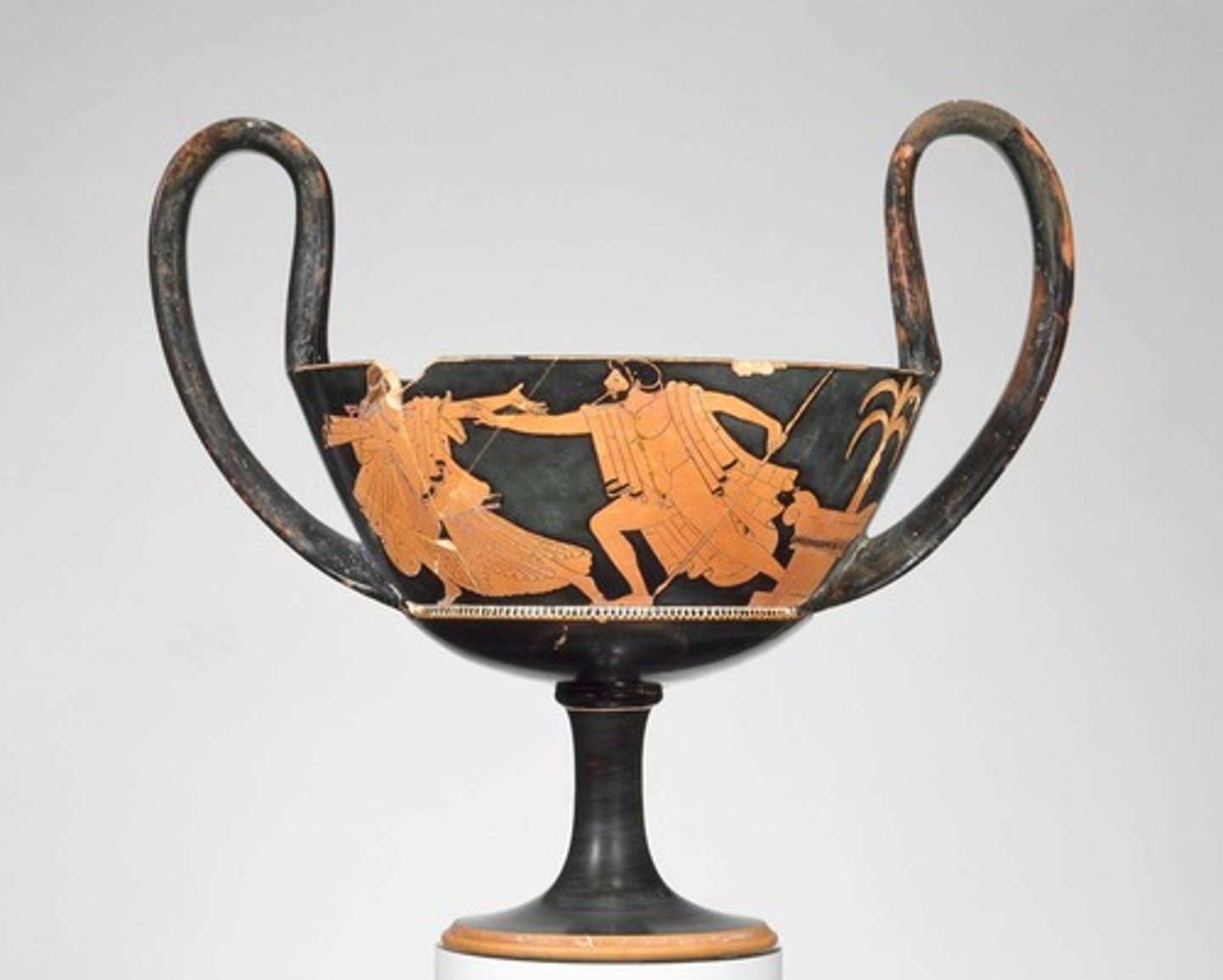
Skyphos
A two-handled deep wine cup on a low flanged base or none with horizontal ear-shaped thumbholes. Used for drinking wine.
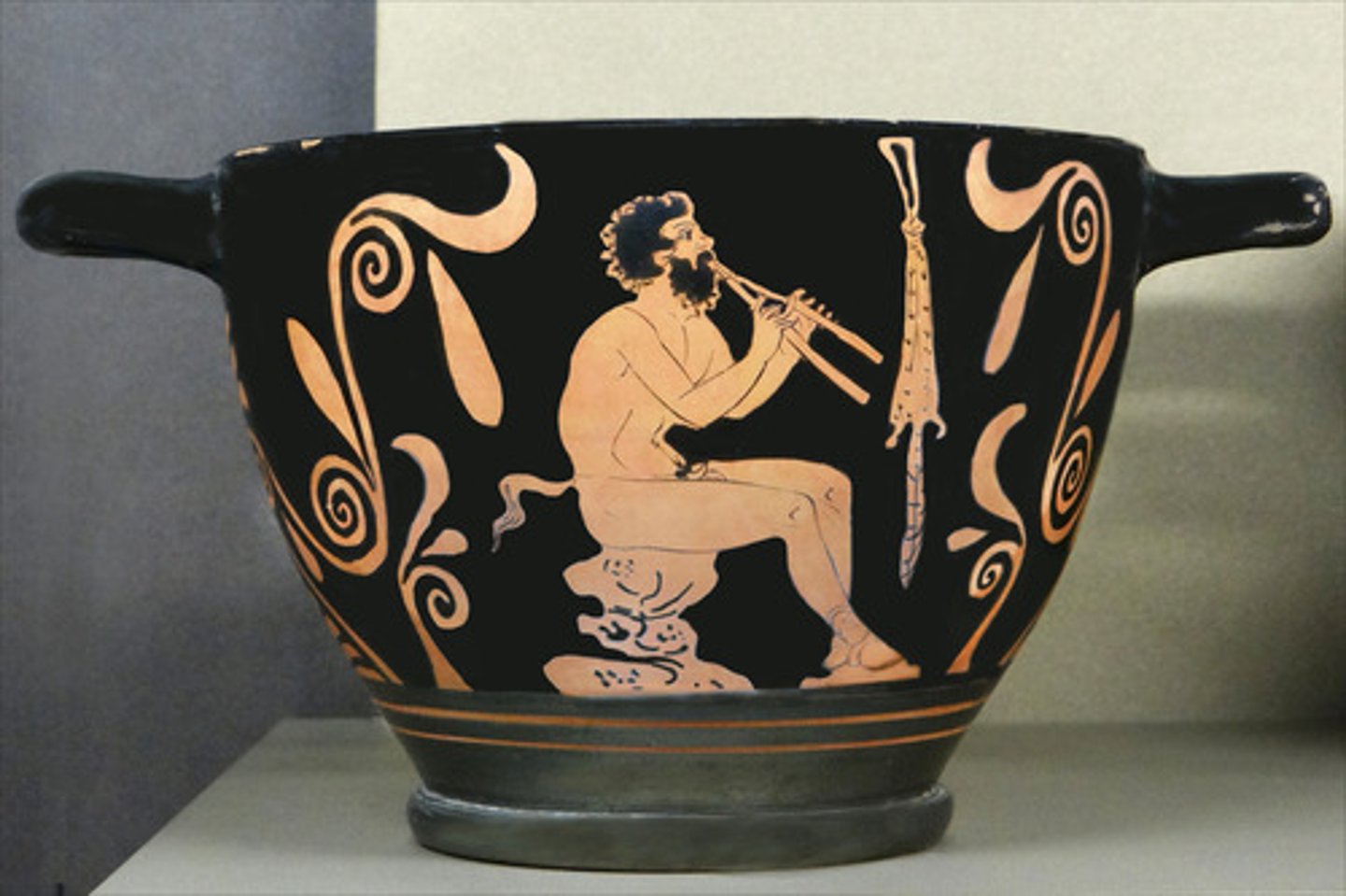
Lebes
A deep bowl, low neck, and handless piece with a rounded bottom. Used as a mixing bowl in the symposium
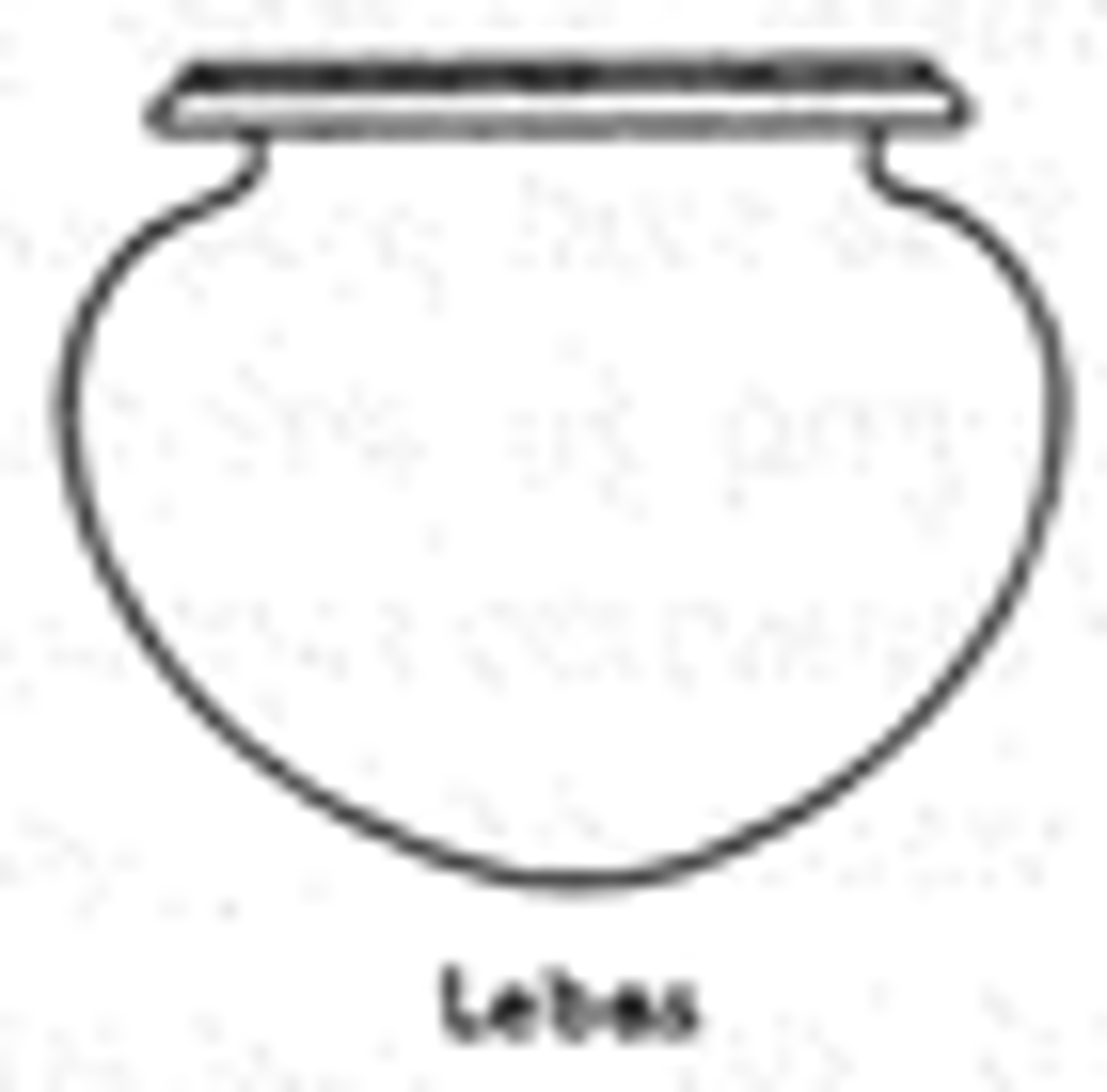
Olpe
A jug with an uninterrupted mouth rather than a distinct spout. A type of mug with swung handles that rise above the rim of the pot.
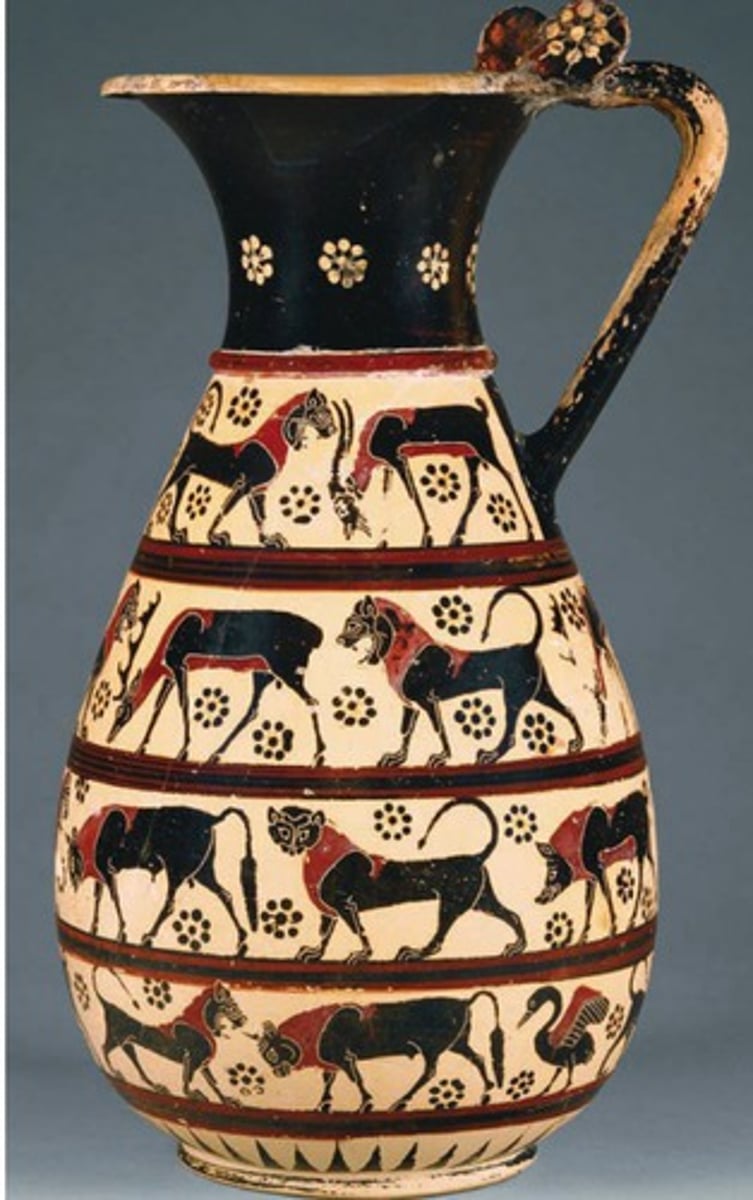
Phiale
A shallow bowl-cup for pouring libations, designed to fit the hand with fingers in the hollow and thumb on the lip.
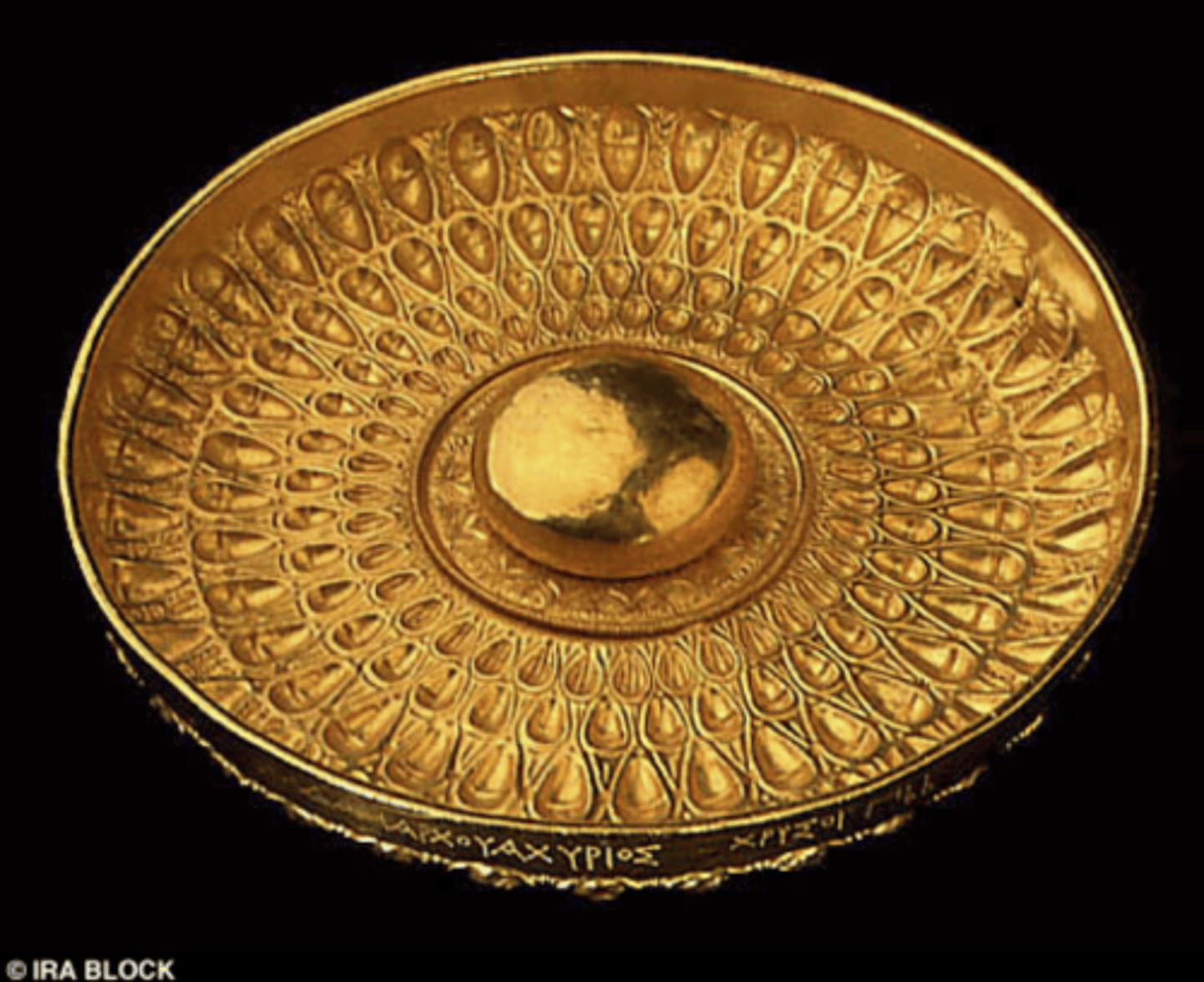
Lebes Gamikos
A round-bottomed bowl with handles and a stand used in marriage rituals.
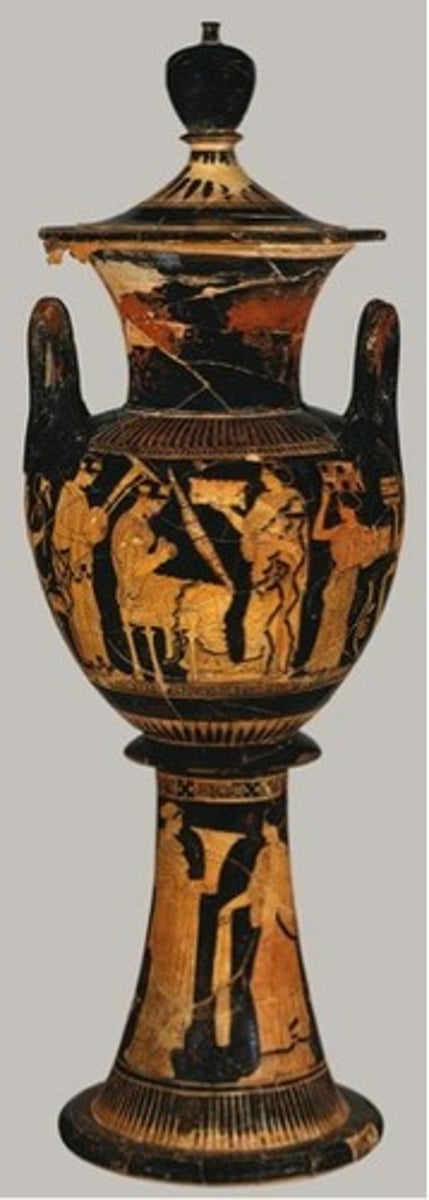
Loutrophorus
A ceramic vase characterizes elongated neck with two handles. Used to carry water for a bride's pre-nuptial ritual bath.
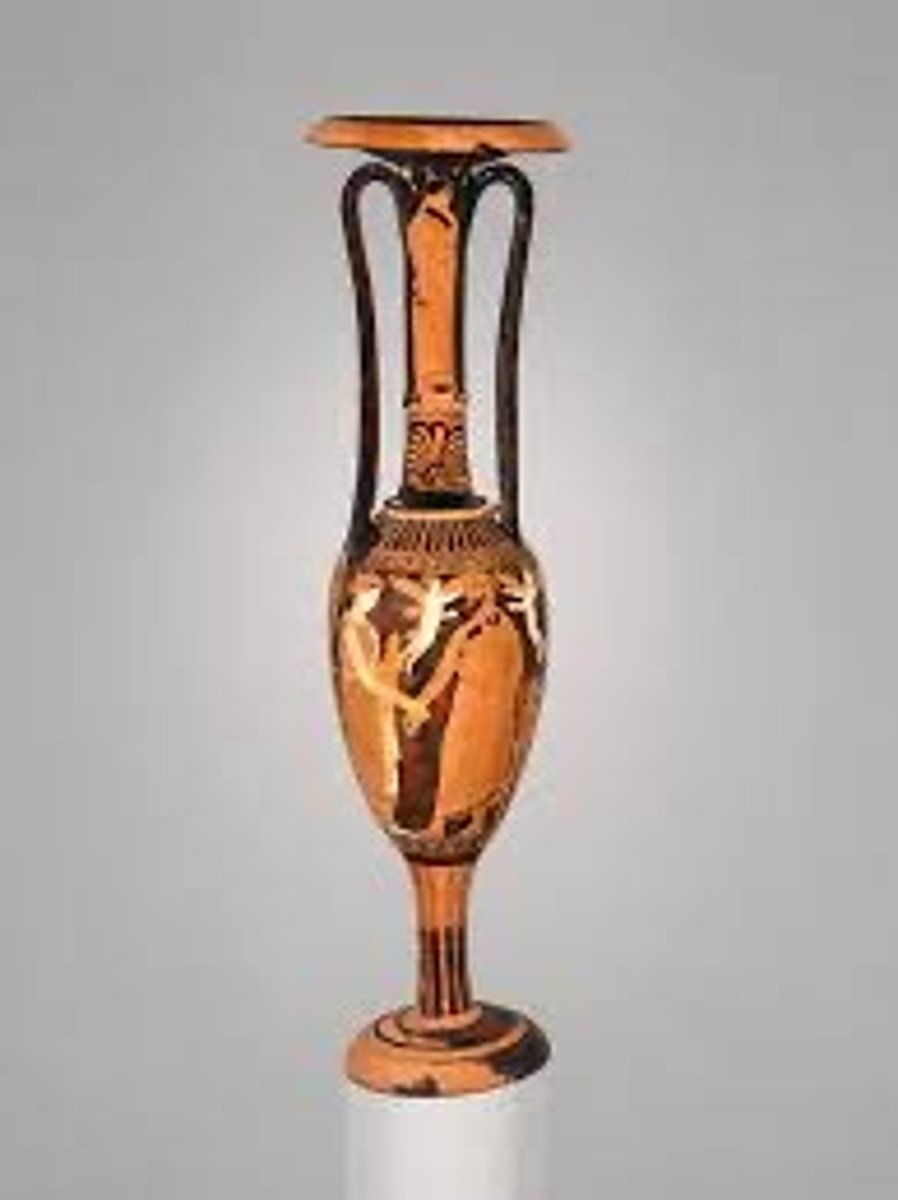
Lekythos, Squat Lekythos
A small, narrow-bodied Greek vessel with a single handle to store oil.
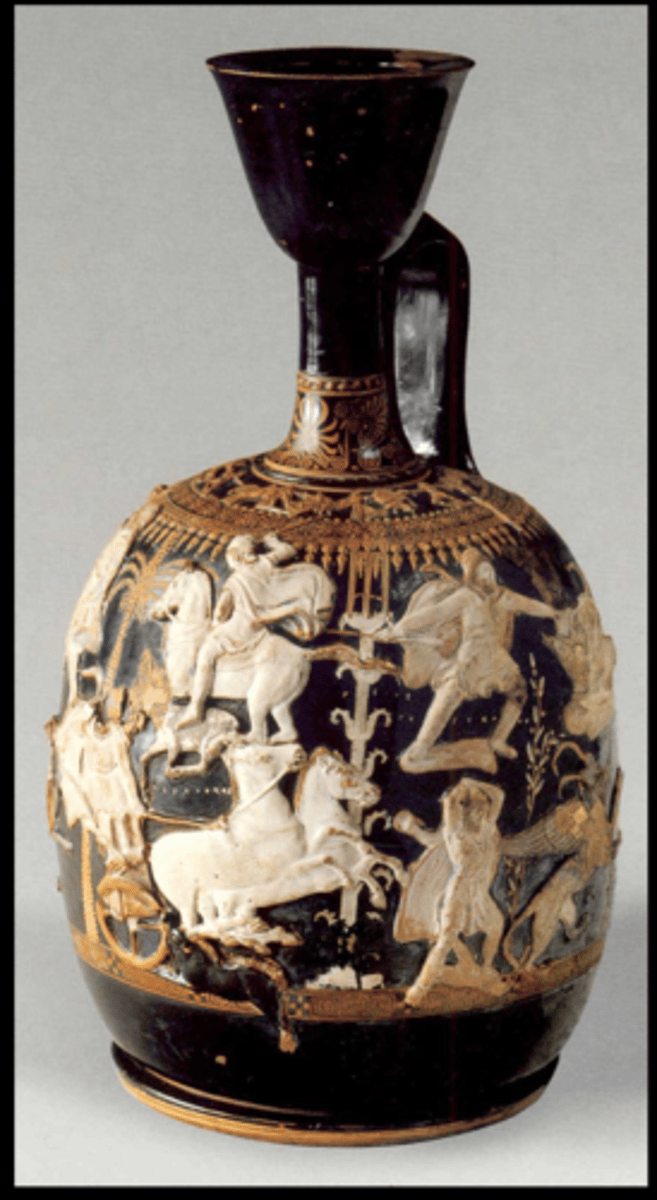
Aryballos
A small spherical flask with a narrow neck. It used to contain perfume or oil and is commonly seen strapped to in athlete's wrist.
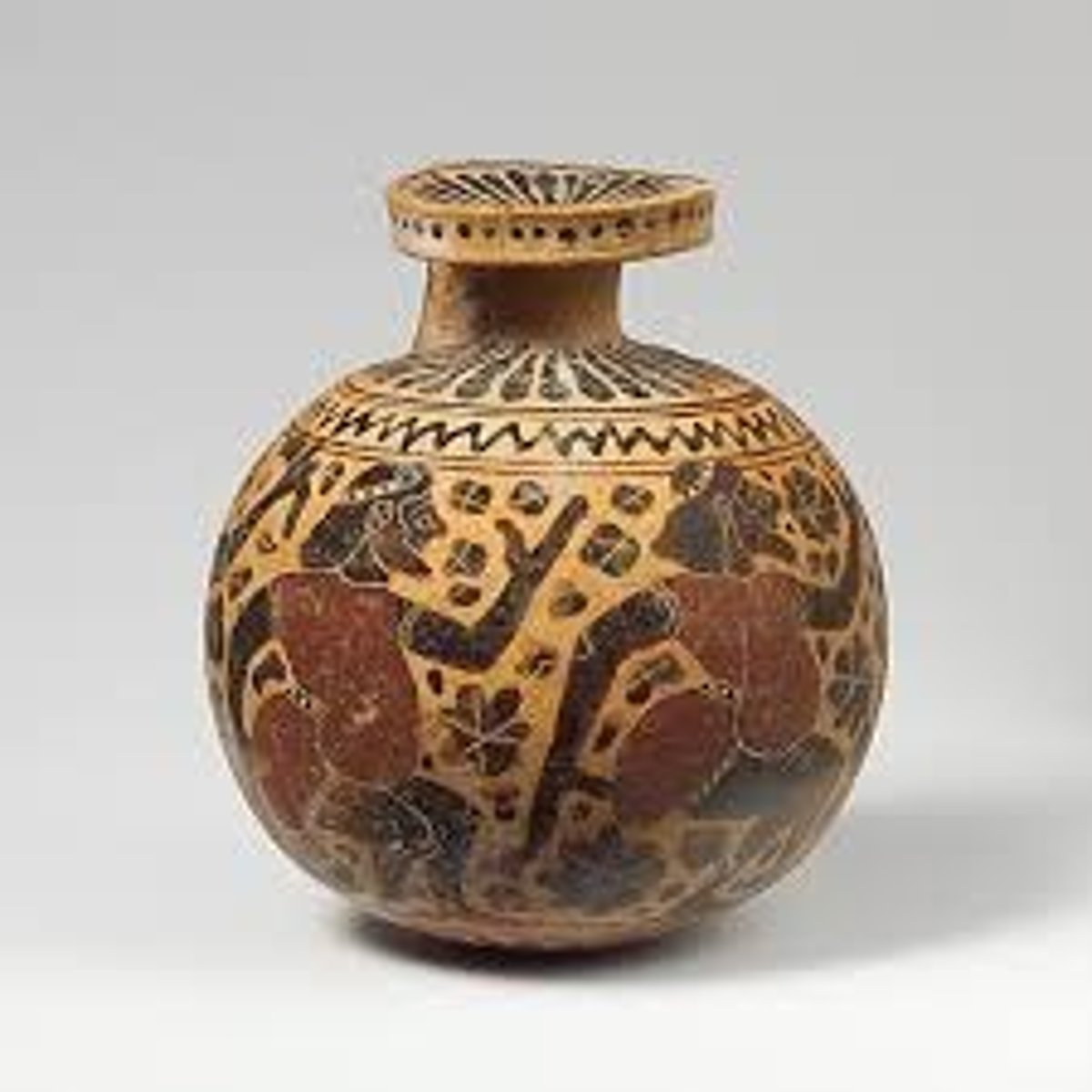
Alabastron
A small vase used by women for perfume or oil storage.
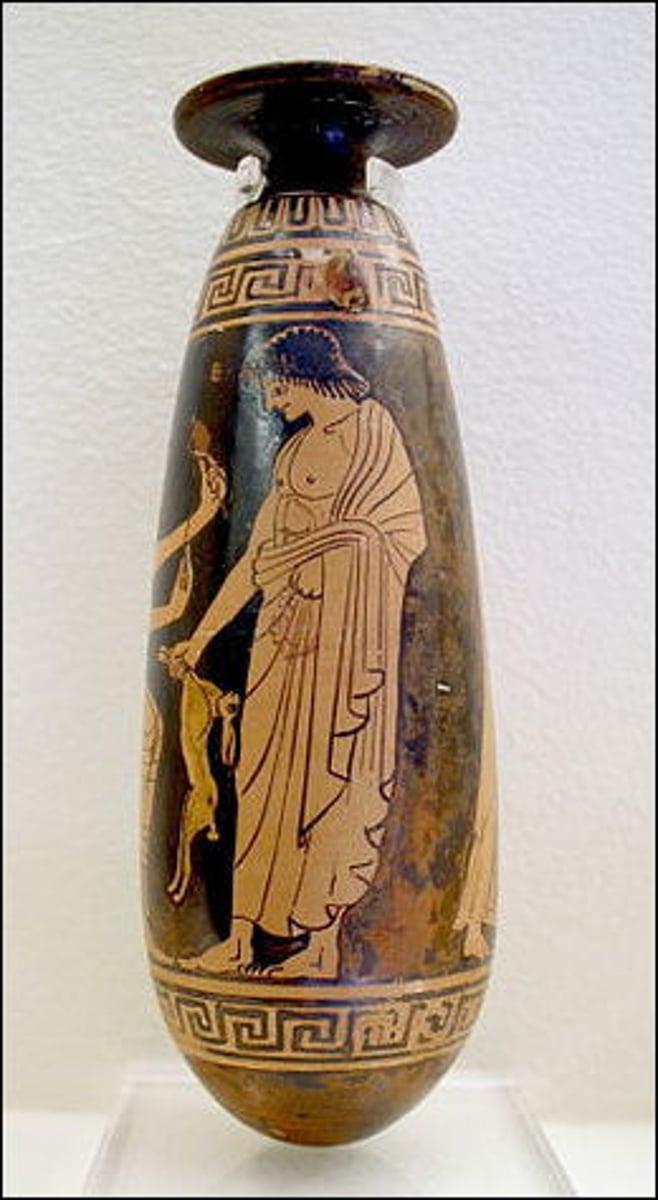
Pyxis
A small pot vessel to store cosmetics, powder, or jewelry.
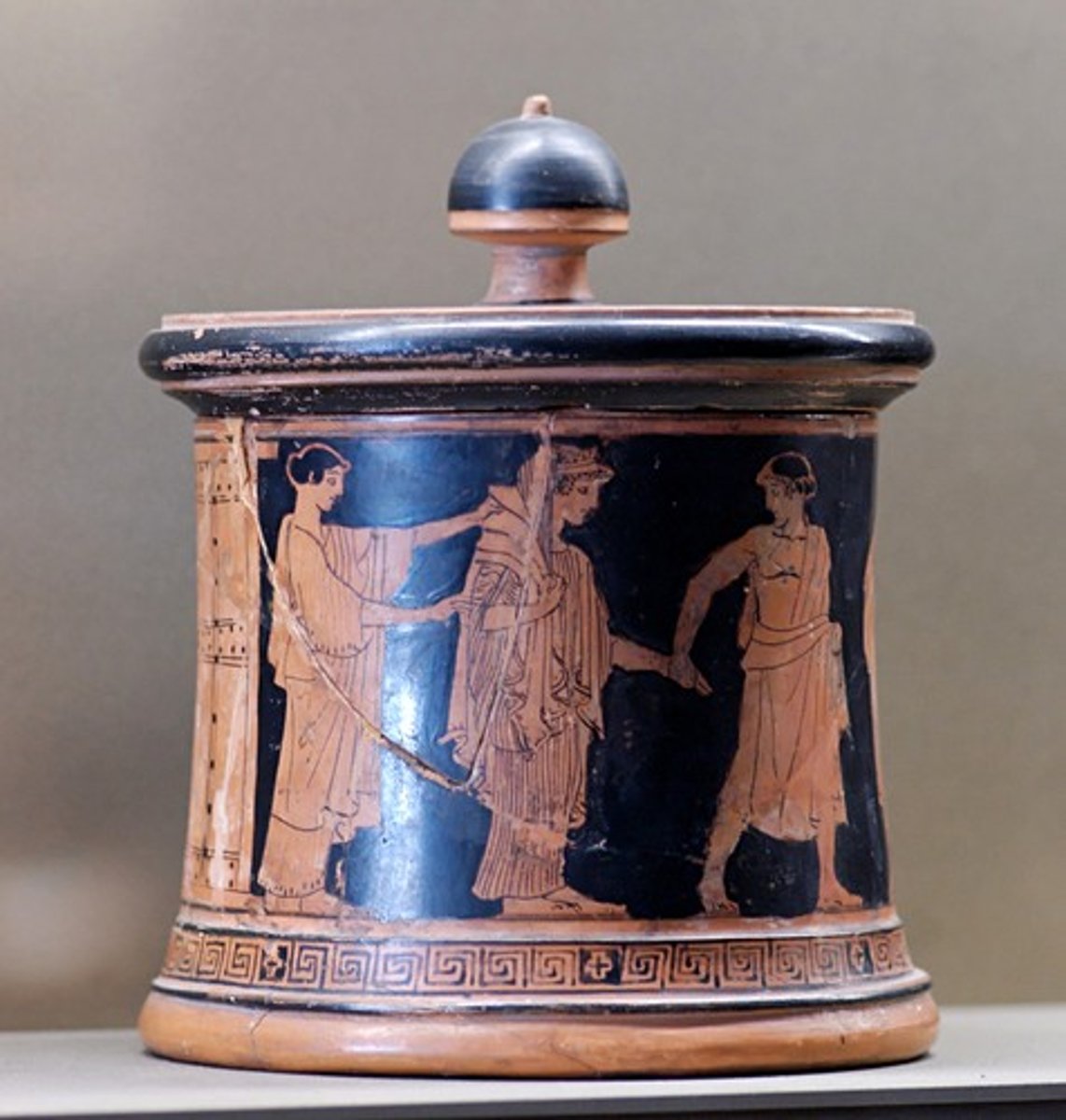
Kourus
Nude male statue from the Greek period
Kore
Clothed female statue with an archaic smile dressed in Pelos.
Severe Style
A specific style of Hellenic statue shows movement, nature, and freedom of form. Used the lost wax method and bronze casting.
Contraposto
A statue pose that shows a balanced body on one leg while other is free.
Geometric Style
What vase style shows rectilinear meander patterns and framed or circular horizontal borders emphasizing the shape? (Greek Archaic)
Black figure
figures painted in black silhouettes on a background of light-colored clay. (Greek Archaic)
Red figure style
a reversed color scheme of black figures showing red figures, invented by Psiax. (Greek late Archaic to Classical)
White Figure
Black/brown figures against white creamed matte background. (Greek Classical to Late Classical)
Doric
Earliest/massive column with no base. Fluted shaft and plain capital. Masculine Symbolism.
Ionic
The "Feminine" column style shows double-carved scrolls like the ram. Lighter than Doric.
Corinthian
A column consisting of small corner volutes, carved forms of acanthus leaves at the lower part of the capital. Maiden symbolism
Caryatids
Columns carved shafts in a draped female figures.
Telamones / Atlantes
A Sculpture in male form that can be seen in the Greek period.
Kline
A bed or couch in Greek period used for eating during the day and sleeping at night.
Klismos chair
This is a chair with a slightly concave backrest supported by uprights that continue the elegant curves.
Thronos
The elgin marble chair, a throne chair for men.
Cofferings, flat, beamed, polished stucco
Interior ceiling treatments of Greek interiors.
Mosaic
A technique for floor treatments during the Greek period consisted of small square pieces, such as stones, glass, and gilded tesserae, set in mortar and ground to a smooth surface to create images.
floor packed earth, painted pavement or mosaics (trompe l'oeil sectile)
Interior floor treatments of Greek interiors.
Cornice, main field, dado
Three (3) divided zones of the wall for interior treatment.
Oecus
It is a living and working space in an ancient Greek house used by women and children.
Courtyard or patio
Rooms are round the court
Symposium
A social event with food and wine, were held in the andron.
Gynaeceum
women's quarters in the Greek period.
Andron
Men's dining room
Concrete
A contribution by the Romans, which allowed them to build structures lighter than stone; Pozzolan
Pozzolana
Hydraulic cement, perfected by the Romans, is made by grinding volcanic material with powdered lime.
Arch
From wedge-shaped stones formed by the use of centering impost that serves as springer
Discobolus
A sculpture that portrays a discus thrower. Used 3rd leg for balance.
Lacoon and his sons
A sculpture that portrays characters of a trojan legend. Giant serpents were sent by gods to chomp on them.
Horizontal entablature, Capital, Shaft, and Base
Major parts of Greek order? (top to bottom)
Entasis
A technique applied on columns which do not taper in a straight line, but bulge outward about one-third of the way up from the base.
Fillet
What is a Greek molding featuring small, flat rectangular or square ribbon-like bands that separate moldings and ornaments?

Fascia
What is the plain, wide band (or bands) that make up the architrave section of the entablature, directly above the columns?
Torus
What is a Greek molding with a protruding convex surface, resembling the exterior of a circle?
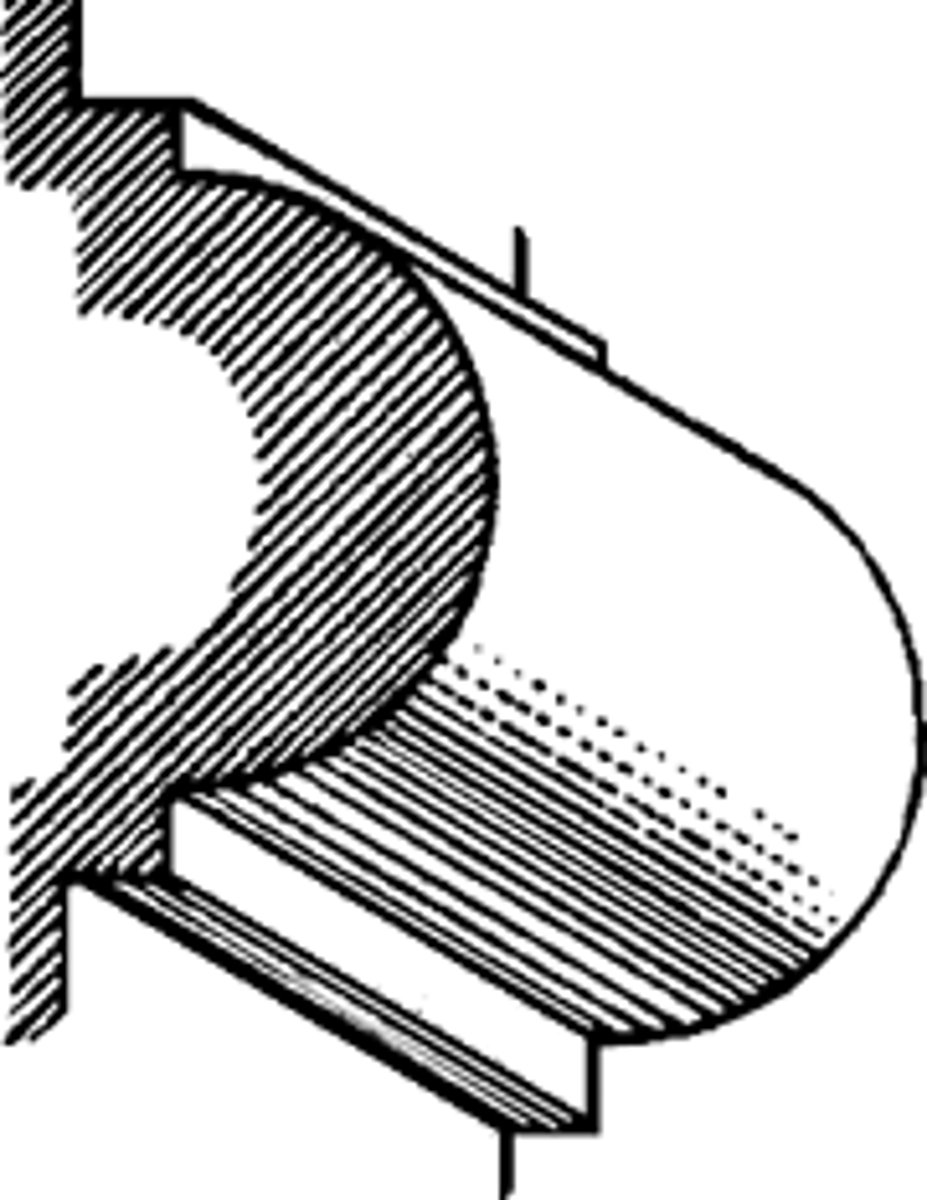
Scotia
What is a Greek molding with an extruding concave shape, often used in column bases?

Cavetto
What is a Greek molding with inward cove bows, often used where interior walls curve at the top to transition to the roof?
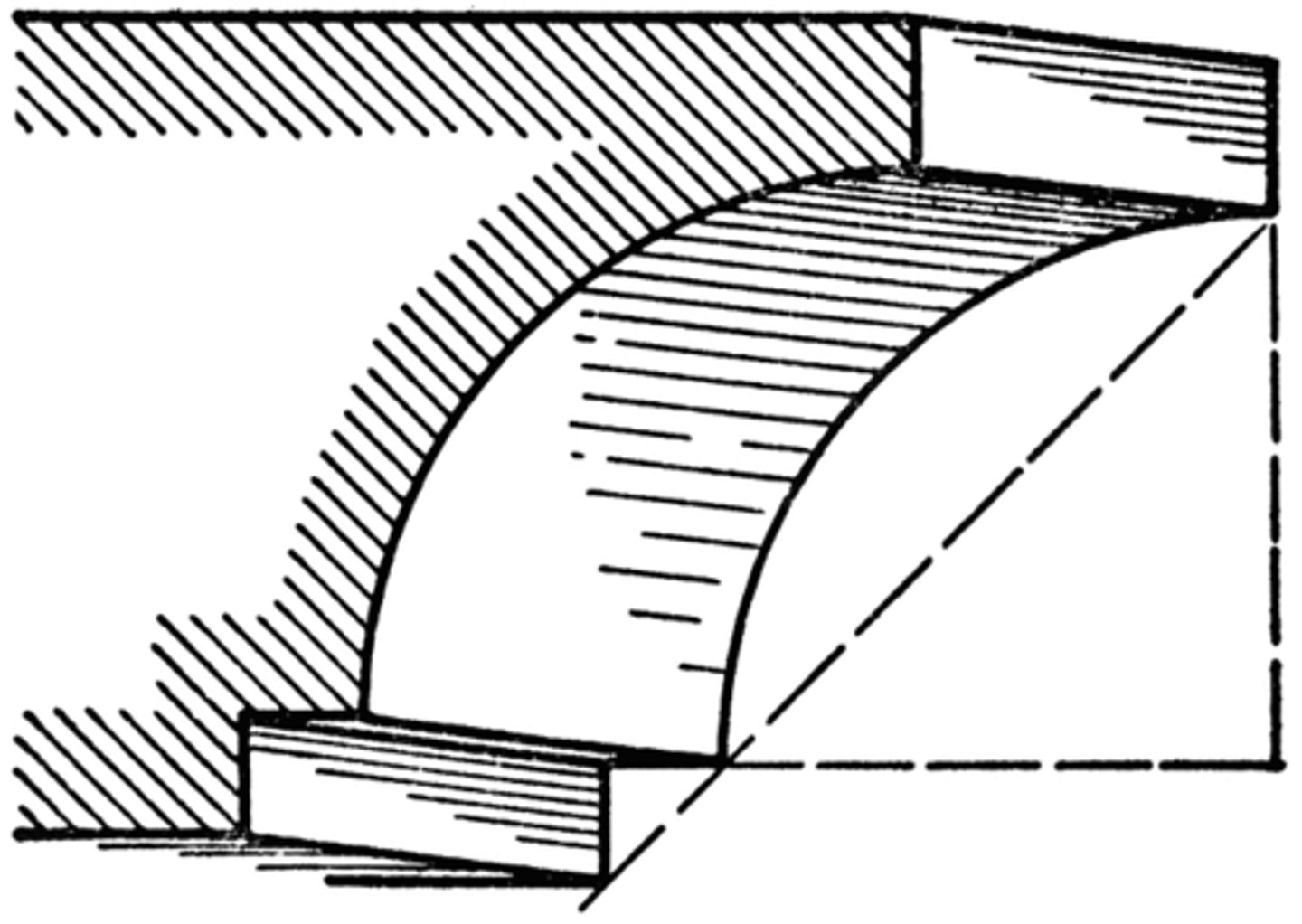
Ovolo
What is a Greek molding with a convex quarter-circle surface, often featuring an egg-and-dart motif?
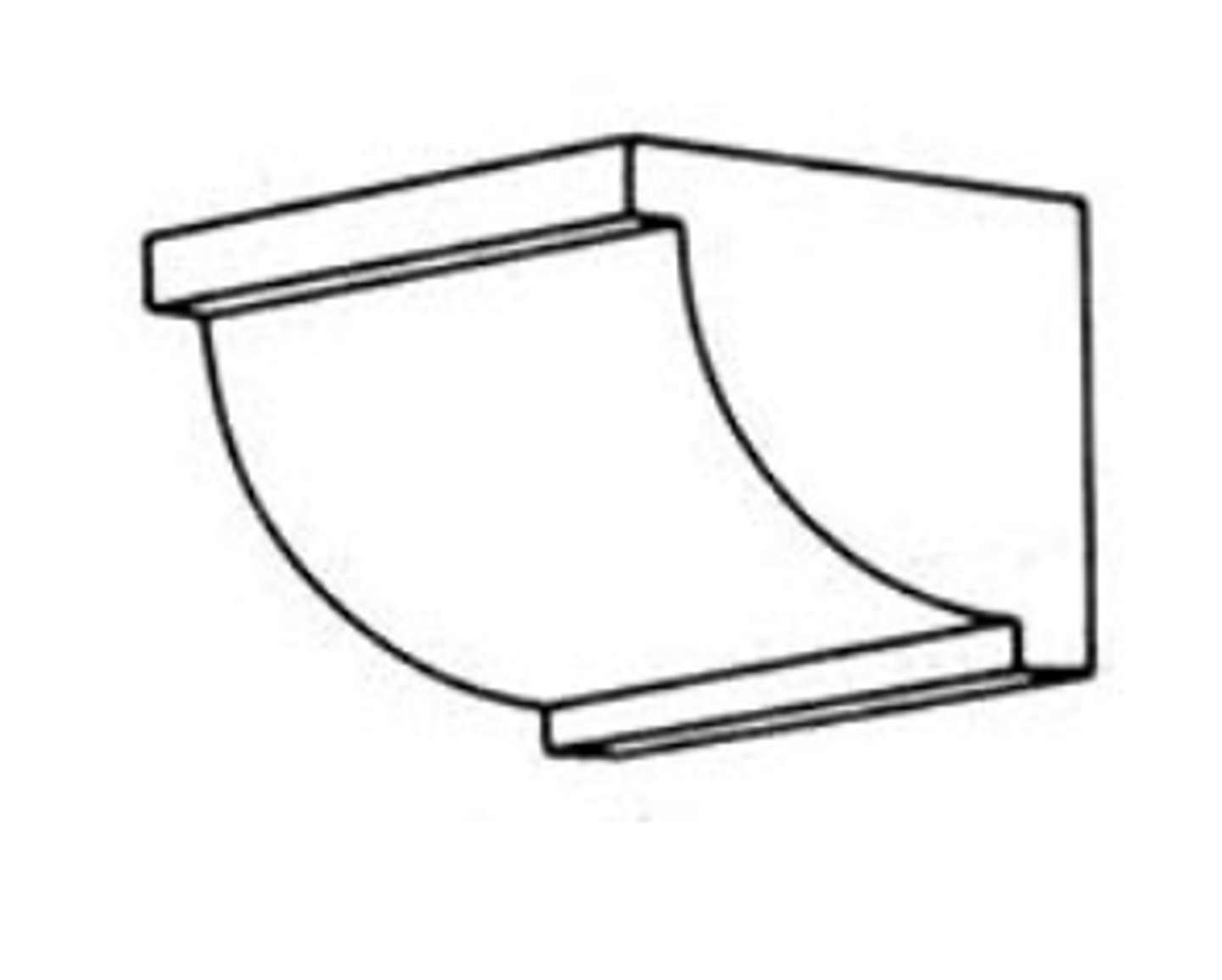
Cyma Reversa
What is a projecting Greek molding with an ovolo above the cavetto, usually featuring a waterleaf motif?
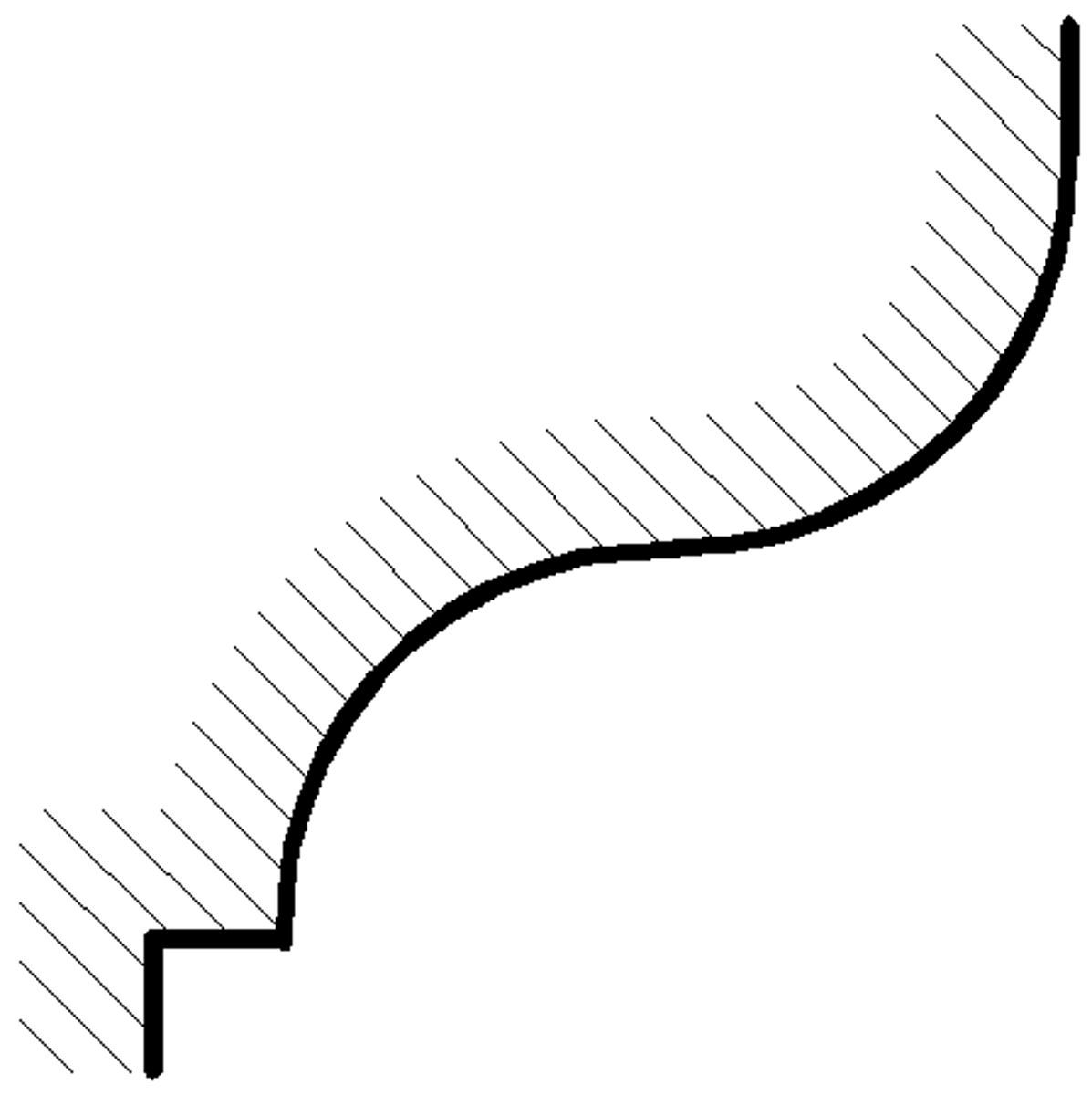
Cyma Recta
What is a projecting Greek molding with a cavetto above the ovolo, usually featuring a honeysuckle motif?
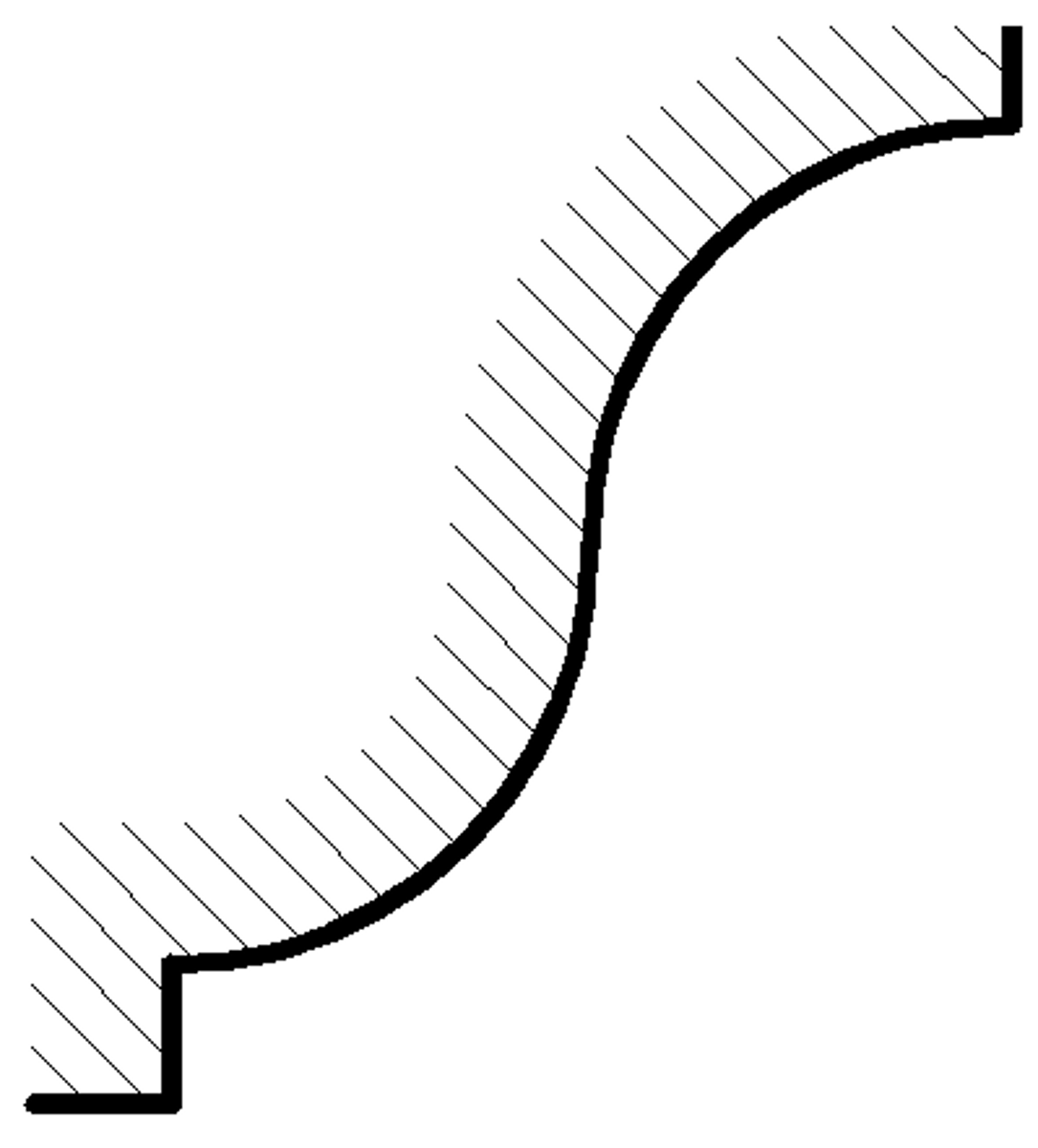
Astragal
What is a half-round surface surrounded by two flat planes (fillets), used at the top or base of a column?
Bead
What is a decorative architectural motif/molding consisting of a thin line where bead-like elements alternate with cylindrical ones, similar to the bead-and-reel motif?
Bird's beak
What is a molding with a section that resembles a bird's beak?
Quirk
What is a molding that features a small groove?
Cymatium
What is the uppermost molding made of the S-shaped cyma molding at the top of the cornice in the classical order?
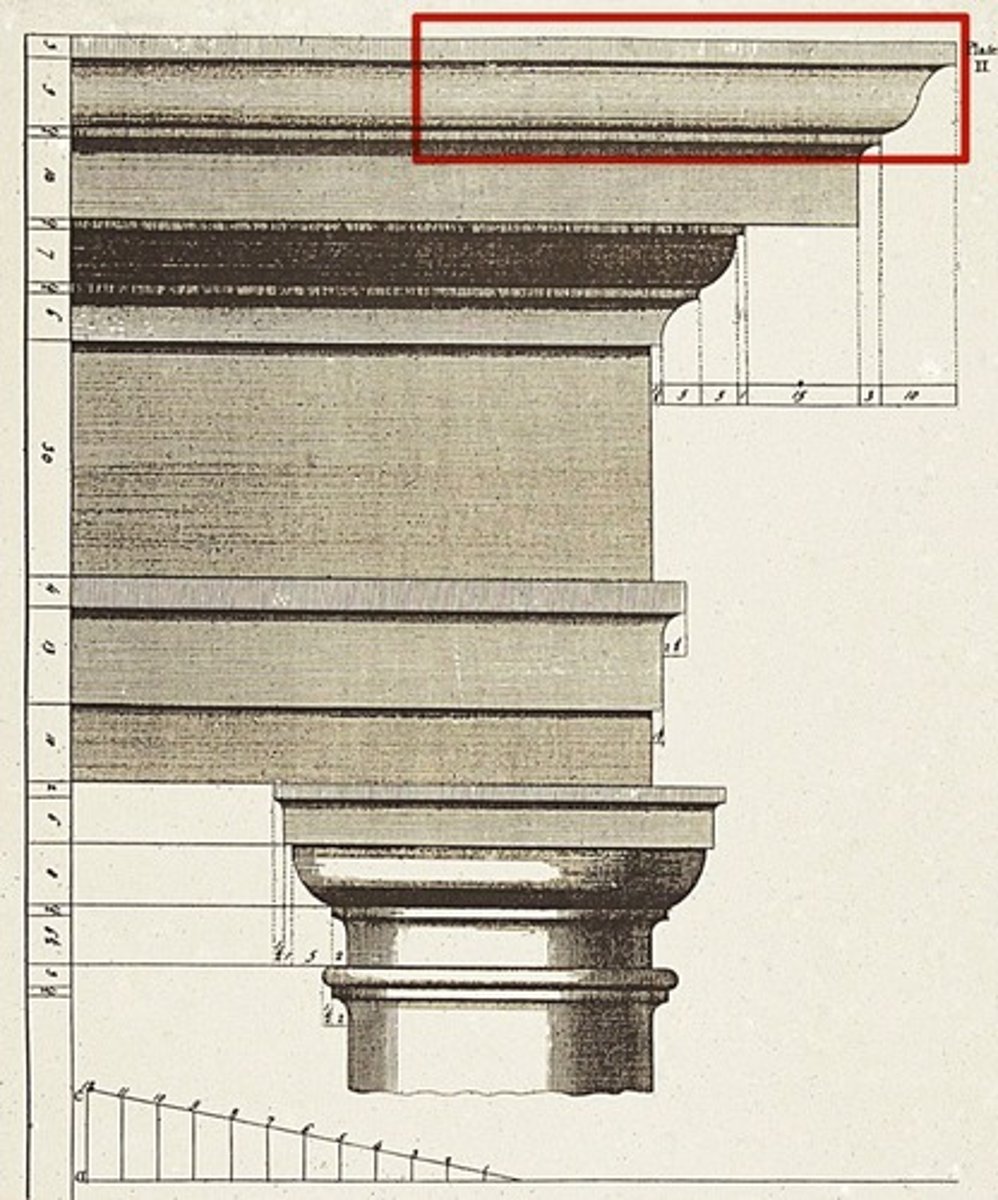
bolection
What is a decorative raised molding that projects beyond the face of a panel or frame?
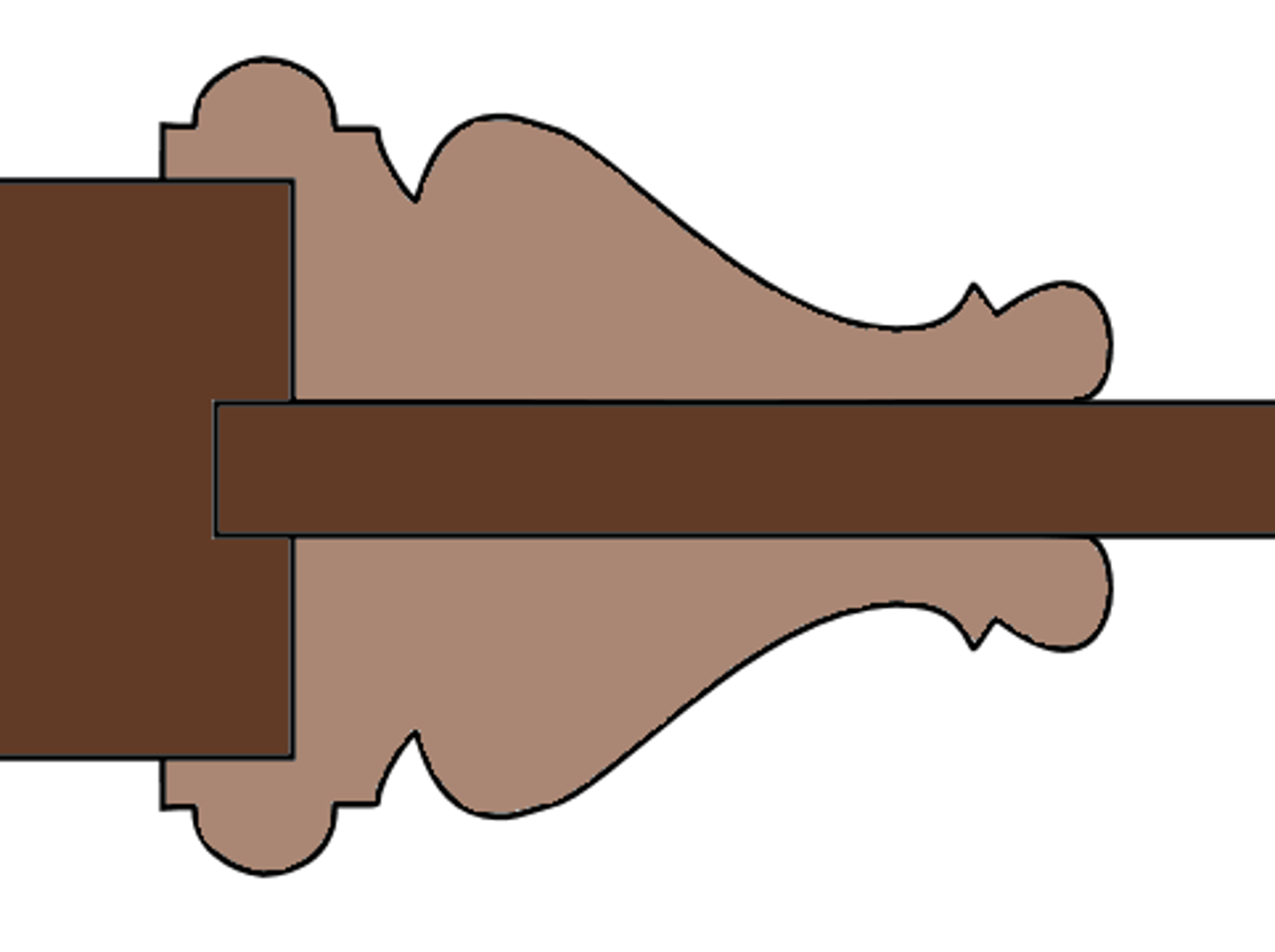
Ogee
What is a classic molding or architectural form featuring a double curve, often described as an “S” or serpentine shape?
Congé ( or apophyge)
What is a small, exaggerated cavetto located at the lowest or highest part of an Ionic or Corinthian column?
Megaron
Also known as the "Big Room," it was a prehistoric throne room during the Aegean Period. A large rectangular room with a central hearth and opening for the smoke to escape.
Mycenaean
One of the cultures in the Aegean period, known from the land of the Legend of Troy.
Minoan
One of the cultures in the Aegean period was named after Minos, known as a generic name for ruler.
Linear B
In the culture of Minoan, this form of writing shows records and early inventories in Greek script.
Linear A
In the culture of Minoan, this form of writing shows Palaces and religious writing.
Snake Goddess
It is a 1ft tall faience female figurine from the Aegean period, incorporating snakes, associating water, regenerative power and protection of the home.
Rhyton
It is a vessel used to pour liquids during sacred rituals in the Aegean period.
Male: Red/brown skin ; Female: fair skin with pinched waist
In the frescos from the Aegean period, what are the characteristics to define between male and female?
The Toreador
It is a wall painting from the Aegean period that shows a bull between two men that depicts initiation or fertility ritual, a correspondence with the legend of Theseus.
Ladies in Blue
It is a wall painting from the Aegean period that shows heads and upper torsos of three women with long tresses, headbands, flounced dresses of open bodice. Blue is the predominant color.
Red shaft with black capital
It is a tapered column that can be seen from the Minoan culture, made of wood
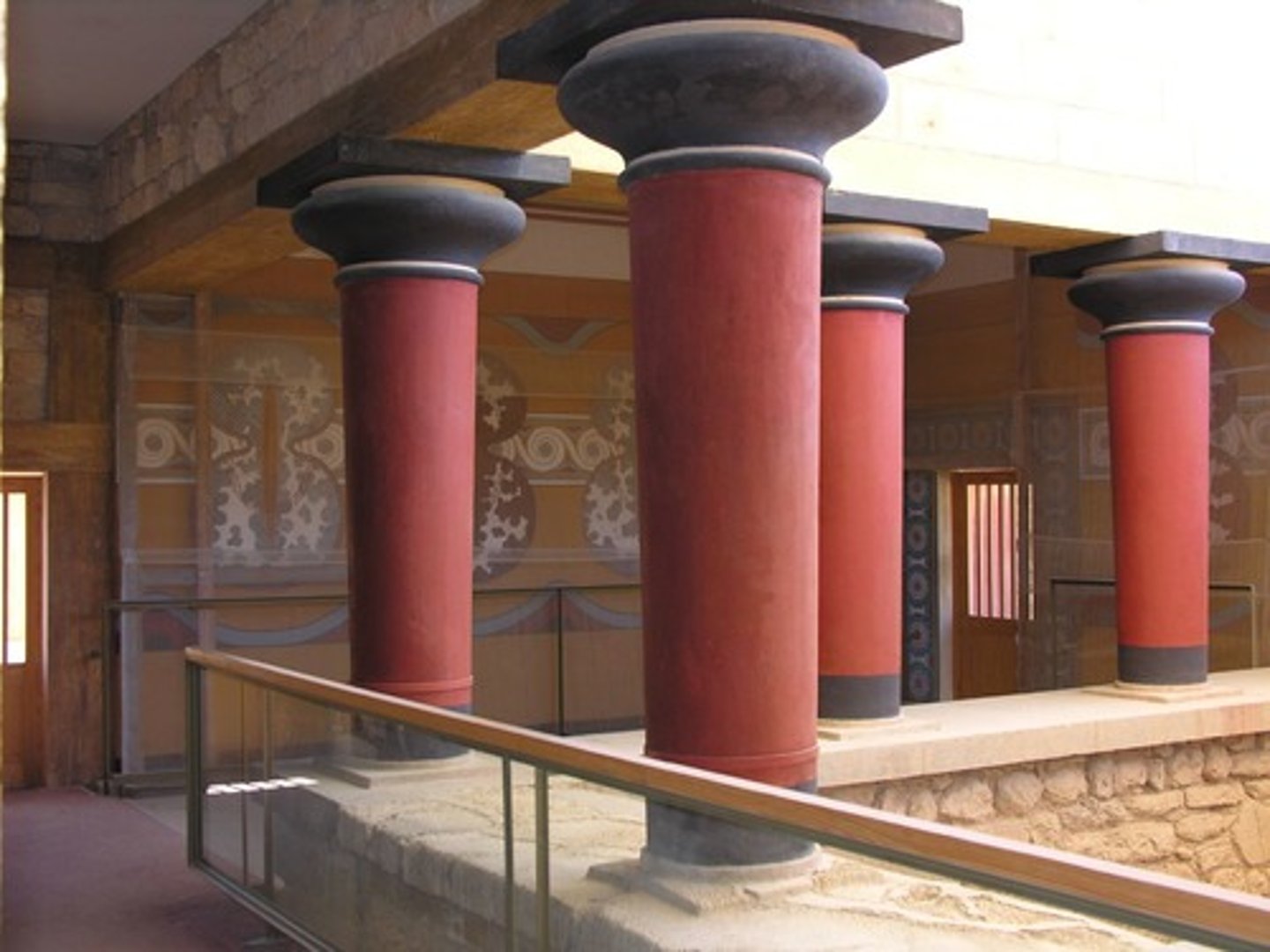
Lion Gate
It is a a post and lintel construction with a pair of lions above the corbel arch, located in Citadel at Mycenae.
Corbel Arch
It is a type of arch that relieves the lintel of the weight of the wall
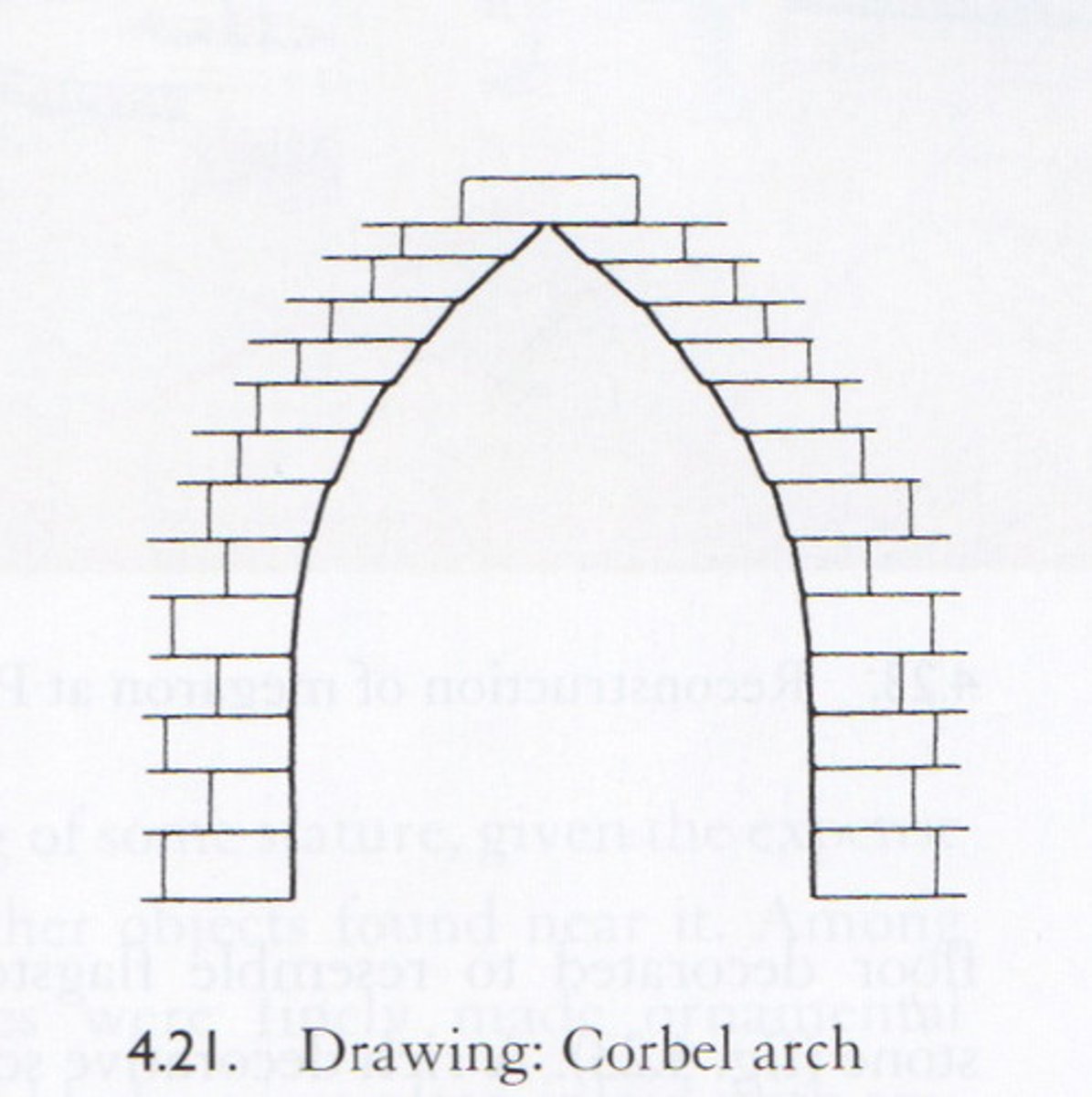
post and lintel, corbeled arch, arch
What are three ways to support an opening of a passage way?
Portico
It is an area of a Megaron that consists of 2 columns with interior decorated tiles.
Corbelling
A parallel masonry layer that extends outward in layers to form an arch or vault.
Cyclopean Masonry
Known as an Ashlar masonry block, it is a method of stone construction, large irregular blocks of stone.
Front porch, Antechamber (vestibule), Naos, and circular hearth.
What are the parts of the Megaron?
Winged Victory of Samothrace
It is a sculpture from the Greek period placed in front of a ship
Hellenistic Period
It is a sub period of the Greek that pertains the death of Alexander the Great and the exploration of new subjects for the artists.
Agora
It is a form of Greek Architecture used as a meeting place platform for the speaker
Stoa
It is a form of Greek Architecture that showcases a long colonnaded multipurpose building.
Acropolis
It is a form of Greek Architecture wherein a city/citdel sits upon a hill.
Temple
It is a form of Greek Architecture built to house the deity. It consists of Hypostyle and sanctuary.
Theater
It is a form of Greek Architecture for plays and performances. It consists of stone seats wrapped around the orchestra and face the skene.
Mausoleum
It is a form of Greek architecture that is a large tomb with place for entombment above the ground. The name came from King Mausolos.
Auditorium, Odeon, Stadium, Hippodrome
What are the different 4 types of theatre in the Greek Period?
Auditorium
A type of theatre used for political campaigns in a semi circular form and hollowed out hill.
Odeon
A type of covered small theatre used for singing presentations.
Stadium
It is a type of elongated theatre used for foot races.
Hippodrome
It is a type of theatre used for horse and chariot races.
Parodos/exodus, Proscenium, Skene, Orchestra
What are the parts of a theater (rear to front)?
Parodos/exodus
It is a part of a theater that works as an entrance or exit of the high portals on each side of the orchestra.